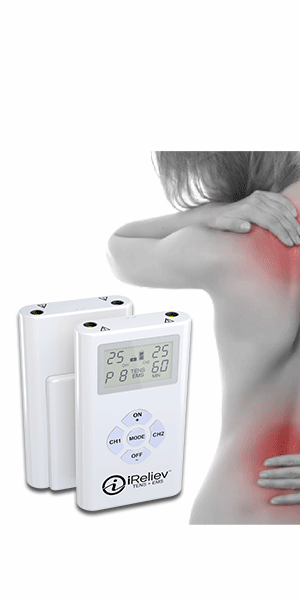
Why don’t more people know about a TENS unit for labor and birth? If you want a healthy birth for baby and mother, you have a few choices. One of the choices to help achieve a natural un-medicated birth is a TENS unit. TENS stands for Transcutaneous Electrical Nerve Stimulation.
What exactly is a TENS Unit?
A TENS unit is a battery-operated device with electrodes connected to it. Through the electrodes a low voltage current stimulates the nerves through the skin. It can be a real “life-saver” for those who suffer from chronic pain from sore or tight muscles or to prevent muscle atrophy after surgery. The current through the electrodes obstruct the pain signals from your nerves to your brain. You will still feel the pressure of the contractions but without the pain.
Combining comfort positions, deep abdominal breathing, and relaxation, with a TENS Unit can make your labor so much easier to cope with. You can look back at your baby’s birth as a great experience, an empowering event in your life.
Best Kept Secret: TENS Unit Relieves Pain from Labor Contractions!
Why choose to use a TENS unit during labor when I can have medication? The simple answer is that there are risks as well as benefits of using medication during labor. Most people, especially in the United States think it’s impossible to labor without pain medication. But most expecting parents don’t take the time to learn about both the risks and benefits. Though an epidural can be very effective in relieving pain, there are risks to both mother and baby.
Benefits of Epidurals Some Risks of Epidurals
| May give total pain relief | May not give pain relief, may give relief in only parts of the body but mother can still feel pain. |
| Allows mother to rest or sleep. | Drop in blood pressure causing fetal distress |
| Allows tense mother to relax | Fever in mother |
| Physical and behavioral effects in the newborn | |
| Slows down labor | |
| Increases risks of Cesarean, episiotomy, forceps or vacuum extraction, need for Pitocin to speed up slowed labor |
A TENS Unit Can Be Used Without a Medical Professional
It’s up to the laboring mother to apply it and turn it on or off. It’s simple and effective to use. Though some women find it more effective than others. You won’t find many doctors or hospitals recommending use of a TENS Unit for labor. Hospitals make a considerable amount of money if you get medication or have a surgical birth. They don’t make much money when you have a natural birth with no medications or interventions. Historically, hospitals and doctors in the U.S. have been trained to use pharmacological means to manage labor and birth. Though the TENS Unit has been used in Scandinavia for decades, it still hasn’t become the norm here in the U.S.
Several Research Studies Done – TENS Units Used in Labor
According to a Cochrane Review of Several Research studies:
- “There is some evidence that women using TENS in labour are less likely to rate their pain as severe, but the evidence is neither strong nor consistent.”
- “Women using TENS applied to the back (and many using placebo devices) were willing to use TENS in future labours.”
- “The relative acceptability of placebo devices may suggest that the device offers a useful distraction, and the fact that women themselves operate the device may enhance a woman’s sense of control.”
- “TENS does not seem to increase the use of other interventions or cause harm to mothers or babies.”
- “Women should be offered the choice of using TENS (with or without other analgesia) at whatever stage of labour they think it might help.”
TENS Units Can Be a Powerful Tool for Laboring Mothers
A TENS Unit can be a potent tool in helping to avoid the risks of medication during labor. It gives mothers more control, which helps them feel more satisfied with their birth experiences. Discuss with your caregiver your intention to use a TENS Unit. Or hire a doula who can give you access to a TENS Unit in labor. And along with using a TENS Unit in labor and birth, make sure to take a good childbirth class beginning in your 6th month and get the knowledge and skills and preparation so that you can have the safest and healthiest birth possible for you and your baby.












